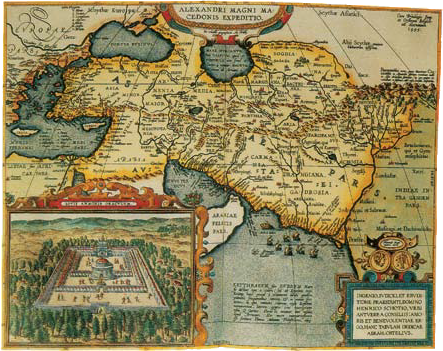In 327 Alexander fulfiled two years of continues war and with faith for success he was going towards the land of the river Indus and the tributary of (today’s Pakistan and Kasmir). If he conquered India, he would have conquered all of Asia. Against him he had excellent warriors, whom were not united and had great disputes between them, which caused conflict against each other. Alexander, either with war or negotiation commandered the Aspasious, Gouretious and the Assakinous.
The briding of the Indus river played an important role in the campaign. The spring of 326, Alexander was the first to step in India and the 75.000 men.
At Taxila Alexander accepted presents of submission from the local leaders amongst them and Avisari (today’s Kasmir). They continued towards Hydaspes where king Poros did not declare obedience. Alexander defeated him after a battle, whereas the king’s insight prevailed again. He sacrificed to the god Helios who allowed him to conquer the country near his east. At the meeting of the Macedonians he said that the Indian riches were theirs and that it continued up to the East and the Ocean.
The army relaxed for a month and Alexander established two new cities, Nikia and Bucephalia in honour of his horse Bucephalus, which had died of old age after battle.
Alexander had two choices: One was to go south following the Indus river towards the oceanus and the other to continue east. In the beginning he went to the river Akesini, to the river Idrioti and then to the Beas river, where he believed that he would find the end of Asia and the Oceanus. At Sagala (today’s Lahore) he was informed that Oceanus was there, far in the East, after the valley of Ganges river.
Alexander called for a meeting with the Macedonians generals, asking them to follow and support his decision to reach Oceanus after the valley of Ganges. Koinos represented the generals, whom expressed himself by saying that they wanted the army to return. Alexander’s anger against his co-warriors, for whom he felt did not sympathize with his plans, did not change the Macedonians attitude.
After three days in his tent, being alone, he decided to announce their return back home. At the banks of the river Beas he seperated the army, he built twelve altazes according to the original of his ancestors, especially Hercules, whom had immortalized his achievement in the West with the Pillars of Hercules.

During their return Alexander organized the matters of the regions he had conquered. After the victory at Hydaspe he assigned governers in a region of 2.000 cities and a population over 10 million and reached up to the mountains of Himalayas. Through the rivers Hydaspe, Akesini and Indou Alexander used the navy to return home.
The fleet started in November of 326 with a great athletic and artistic games and Alexander thanked the gods of the rivers and seas, Poseidon, Amphitriti, Nigides and Oceanus.
On the left bank of Hydaspewas Hephaestion and on the right was Krateros, whilst Alexander was the leader of the army the navigation started. The big war nations at the crossroads of Hydaspe and Akestini, the Malli and the Oxudrakes attacked Alexander, who prevaled even though he had lost lives and ships. Alexander himself was seriously injured, that much as most believed he had died. But when he appeared in front of the army everyone cheered. He then established a new city, Alexandreia, at Opini with shipyards foreseeing significance development in trade and strategics.
In continuation he reached Pattala, which was situated at the delta of the Indus river, where he confronted simultaneously rebellion and tributary kings behind and in front of him. There he created a huge harbour, a naval base, a shipyard, and other naval and other port establishments, white sailing in the open sea was considered the end of his journeys and the arrival of the Oceanus.
Alexander had conquerd India to the north of Hydaspe within seven months. The capability of the king and his army was the best forefighter for the victories in the field of the battle, and for the decision of the multiply nations that asked for mercy and to obey. Captain Nearxos sent a part of his fleet towards the Persian gulf, to the mouth of the river Tigris and Euphrates.
In August 325 Alexander and his army of 20.000 men started off, reaching Gedrosia in October. Going through difficult times without water, the Macedonians went to Poura, the capital of Gedrosia and then to Garmania, where they joined Kraterou’s army. Meanwhile they were informed from Nearxos himself that their journey and fleet were safe, after he had taken into account the lakes, inhabitants, the springs of water, he had reached Armolia the entrance to the straits of Hormuz.
The fleet of 150 ships under the command of Nearxos and the guidance of Alexander who foresaw the seas the future to trade and economical development conducted three investigations, reaching Maketia (pennsula of Oman) and Yemen. Moreover from the first moment of campaign, the army and the fleet were accompied by scientists that were part of the supportive team of the big operation of the Macedonian king. The notes that were kept by engineers, mathematicians, astrologers and other scientists were used as tools for the co-workers in Greece and for the rural communities. Many of these were notes confirmed and taught from Alexander great teacher Aristotelous which in many ways supported his exceptional student.
After Alexander’s death, Nearxos published a description of his adventures, which Arrianos saved in a summary. After 20 whole centuries in 1774 A.D. three English sail boats started from Bombai of India and with the only help of fragments saved from Nearxos diary,they would succeed to recognise the coast of Indou and the Persian gulf, accrediting the surprising accuracy of the Greek information 2.100 years earlier.
Alexander went toward Sousa and then to Babylon. He built a new city today’s Kuwait placing Greek mercenaries whilst he had planned to join the main army, starting invasion to Arabia. His operations had the aim to dominate the Persian and Kaspian gulf, making it the base for his fleet, Babylon.
There were guards in the old and new cities, more than seventy and the young and children were educated in the classical Greek way but in the army the Macedonian techniques were used.
The economic development was another gate of the dominance of the Macedonian king. The united currency one gold and one silver was accepted in all the dynasty and even further than this. The relativeness of gold and silver was stable and in the dynasty was adopted the new economy, replacing the exchanging values of goods.
Alexander introduced the Greek representative system and respected religion, ethics and the laws of the Persians and other nations. It was a proposal of harmonic co-existance between many people speaking several languages and having specific differences, a proposal that took place with the model of the Greek way of life and the Greek civilization.
At Sousa in 324, he saw 30.000 young men from different regions of the empire, whom their training started in 329. They were the best successors that would continue in the army and being materialized in the campaign in Arabia. Ploutarchos writes ” He chose 30.000 boys and gave orders for them to learn Greek and to train in the Macedonian army, and appointed many commissaries “.
The juxtaposition that existed between the old soldiers and the young from Asia expressed their contradiction of the Macedonians in the new state.
Their indignation towards the king was confronted with an undisciplined movement, Alexander decided at Opus, which was built at the river Tigri, to discharge the elderly, and the disabled that could not serve the army. Alexander’s decision was considered contemptuous toward the veterans, was another motive for the Macedonian anger, whom considered that they were betrayed by their king. That’s why all the Macedonians rouse and demanded that they were relieved from the army. This undisciplined movement, Alexander did not show his usual leniency towards the Macedonians on the contrary, he ordered death to the first culprits. Then with a lengthy speech which Arrianos saved, reminded the Macedonians everything they owed to him and his father who made them from ” poor shepherds who were dressed in rags pasturing a few sheep on the mountains, I made you into citizens of the cities and capable warriors for our barbaric neighbours and men of wealth of Lindon, the treasures of Persia and the goods of India ” ending up, according to Arriano, who saved Alexander’s words in his book ” Alexander’s Rise” said the following.
” … I want to send the admirable elderly back to the country, but because you want to leave, leave and tell your country that the king, which lead you to victory through countries reaching the Persian outset to the Indou river and sailing together on the big sea up to the Persian gulf, you left him at Sousa and left… “
But Alexander was not an ordinary king Alexander spoke to the old co-warriors about their journey in history, from the Macedonian empire which spread very far, about his wounds that were the same as their wounds, for the humbleness which they lived and for the glory he gave them. ” You are all my people ” he shouted it so everyone could hear.
The Macedonians yield, embraced their king, their person, which Arrianos mentioned. His tears were real for the Macedonians. He organised a banquet to friendship as he named it, where next to him sat the Macedonians and then the Persians and the representatives from all the nations of his kingdom. Over 9.000 people sang the song of victory.
After the banquet, the summer of 324, Alexander suggested to the Macedonians, whoever wanted could leave back to the homeland. Nearly 10.000 accepted to return home but this all had an emotional connection with their life. Even more when emotions of co-existance was for a long period that people live unique moments. The campaigns and victories of the Greeks, like this with leader Alexander, had never happened before.
A little later in October 324, Alexander would come face with a greater challenge in his short life. The death of his best friend, Hephaestion could not be accepted even by a king, or even by Alexander. The pain from the violent seperation of their friendship and the absence of a person was unbearable.


